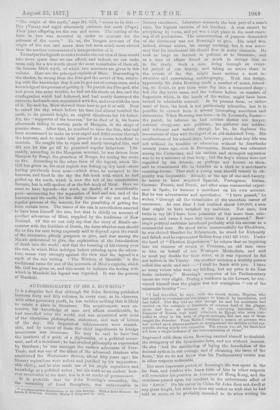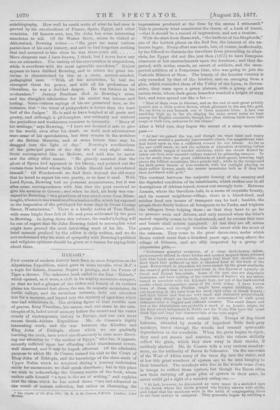AUTOBIOGRAPHY OF SIR J. BOWItING.* IT is a singular fact
that although Sir John Bowring published between forty and fifty volumes, in every case, as he observes, with seine pecuniary profit, he has written nothing that is likely to retain a place in literature. His acquirements were ex- tensive, his knowledge of men ' and affairs considerable, he had travelled over the world, and was acquainted with most of the illustrious philosophers, statesmen, and men of letters of the day. His linguistical achievements were remark- able, and by means of them the chief impediment to foreign intercourse was overcome. He may be said to have 'had the instincts of a poet, of a diplomatist, of a political econo- mist, and of a merchant ; he had studied philosophy as expounded by Bentham ; he was amongst the earliest advocates of Free- Trade, and was one of the ablest of the advanced thinkers who established the Westminster Review, about fifty years ago ; his literary aspirations were ardent and justified by his unquestion- able ability, and he also made use of his ample experience and knowledge as a political writer ; but his work as an author, how- ever serviceable at the time, has in it no marks of permanence. It is probable that Sir John Bowriug's versatility, like the versatility of Lord Brougham, was unfavourable to
• Autobiographical Recollections of Sir John Bowing. With a Brief Memoir. By Lewin B. lluwriull• Loudon: Henry S. Klug and Qo. 1877.
literary excellence. Literature demands the best part of a man's time, the highest exercise of his intellect. A man cannot be everything by turns, and yet win a high place in the mast exact- ing of all professions. The concentration of purpose demanded
of the litterateur was not Bowriug's to give. His mind was, indeed, always active, his energy untiring, but it was neces-
sary that his intellectual life should flow in many channels. He took as large an interest in politics as iu literature, and as a man of affairs found as much to occupy him as. in the study. Such a man, living through an event- ha period of our history, and taking an active share in the events of the day, might have written a most in- structive and entertaining autobiography. With this design,.
apparently, Sir John Bowring made a number of notes, intend- ing, no doubt, to put them some day into a connected shape ; but the day never came, and the volume before us consists of fragments which, in the hands of the writer, might have been.
turned to admirable account. In its present form, or rather.
want of form, the book is not particularly attractive, but it is. possible to extract from it several interesting anecdotes and statements. When Bowring was born—in St. Leonard's, Exeter— the parish, he informs us, had neither doctor nor lawyer, resident clergyman nor publican, tax-gatherer nor soldier, and reformer and radical though he be, . he deplores the innovations of time with the regret of an old-fashioned Tory. His- recollections of his school-days, however, prove that boy-life was not without its troubles or education without its drawbacks seventy years ago, even in Devonshire. Bowring was educated among the Unitarians, and his earliest and strongest aspiration was to be a minister of that body ; but the boy's wishes were not regarded by his friends, or perhaps not known to them, and he commenced life in London as a clerk in a merchant's. counting-house. That such a young man should remain in ob- scurity was impossible. Already, at the age of one-and-twenty,. he seems to have acquired Spanish, Portuguese, Italian,.
German, French, and Dutch, and after some commercial experi- ence in Spain, he became a merchant on his own account. But he was adventurous and speculative. "I have passed," be writes, " through all the vicissitudes of the uncertain career of commerce. At one time I had realised about £40,000, a sum. that ought to have satisfied my ambition. Not once, but
twice in my life I have been possessor of this more than com- petency, and twice I have lost more than I possessed." Bow- ring's political ambition interfered probably with his success as a. commercial man. He stood twice unsuccessfully for Blackburn,.
he was elected Member for Kilmarnock, he stood for Kirkcaldy and failed, and he represented Bolton from 1811 till 1840. Under the head of "Election Experiences," he relates that on inquiring- into his chances of return at Penzance, an old man came to him on behalf of the Wesleyan Methodists, and said he must pay double for their votes, as it was reported he did not believe in the Trinity. On another occasion a wealthy person called him aside and said :--" I shall be frank with you. I have so many voters who wait my bidding, but my price is an East India cadetship." Bowring's memories of his Parliamentary career are very slight. During a residence in the Levant, he con-. vinced himself that the plague was not contagious " out of the- miasmatic locality " :—
" I had travelled, ho says, with tho Greek doctor, llopites, who had sought to communicate the plague to himself by inoculation, and had failed. Olot Boy told me that though he and hie assistants had carried on the autopsis of hundreds of corpses dead of the plague, there had been no instance of its convoying infection. The Emperor of Russia sent many criminals to Egypt, who wore com- pelled to sleep in the beds of plague-patients, but not one of them caught the disorder. From Malta I obtained a return of persons who had waited upon plague-patients or manipulated the articles called sus- ceptible during nearly two centuries. The return was nit, for there had not boon a single instance of the communication of virus."
Impressed with these views, Bowring exerted himself to diminish the stringency of the Quarantine laws, and not without success. He also " had the satisfactinu of laying the foundation of the
decimal system in our coinage, and of obtaining the issue of the florin," but we do not know that his Parliamentary course was in other respects noticeable. The most important period of Bowring's life was spent in the far East, and readers who know little of him in other respects will remember his position as Governor of Hong Kong, and the criticisms passed upon his couduct in the unfortunate affair of the Arrow.' On his career in China Sir John does not dwell at any great length, but what he does say makes us wish that he had told us more, as he probably intended to do when writing his autobiography. How well he could write of what he had seen is proved by his recollections of France, Spain, Egypt, and other countries. Of famous men, too, Sir John has some interesting anecdotes to tell. Of Sir Walter Scott, whom he visited at Abbotsford, Bowring writes : — " He gave me many curious particulars of his early history, and said he had forgotten nothing that had occurred to him since he was three years old More eloquent men I have known, I think, but 1 never knew any one so attractive. The variety of his conversation is stupendous, while it overflows with the most agreeable anecdotes." Guizot appears to have disliked Bowring, and in return the great his- torian is characterised by him as a stern, narrow-minded, pedagogical man. " With all his asceticism, he had the strongest thirst for power, and with all his professions of liberalism, he was a decided despot. He was furious in his
moderation." Jeremy Bentham died in Bowring's arms, and the disciple's admiration for his master was intense and lasting. Some curious sayings of his are preserved here, as for instance, that " the worst of pickpockets is better than the least bad of the Judges." He is said to have laughed at all poets and poetry, and although a philosopher, was evidently not without the prejudices and weaknesses common to humanity. " Many of his writings," says Bowring, " I have not deemed it safe to give to the world, even after his death, so bold and adventurous were some of his speculations, but they remain in the archives of the British Museum, and at some future time may be dragged into the light of day." llowring'e recollections of the principal poets of the day are of very slight value. Scott accompanied him to Melrose, and told him he never saw the abbey after sunset, " He gravely asserted that the ghost of Byron had appeared in his library, and pointed out the curtain from behind whose folds Childe Harold had introduced himself." Of Wordsworth we find little beyond the old story • that he loved to repeat his own poetry, or to hear it read. With Lord Byron, Bowring had no personal acquaintance, but it was after some correspondence with him that the poet resolved to give his services to Greece ; and when he died, his body was con- signed to Bowring, " in a puncheon of rum which came from Misso- longlii, whence it was transferred to a leaden coffin, which lay exposed to the inspection of the privileged for some days in Great George Street, Westminister." There is a kindly notice of Tom Hood, with some bright lines full of life and puns addressed by the poet to Bowring. In laying down this volume, the reader's,fee]ing will be one of regret that Sir John Bowring failed to accomplish what might have proved the most interesting work of his life. The brief memoir prefixed by the editor is drily written, and we do not understand why his want of sympathy with Bowring's political and religious opinions should be given as a reason for saying little about them.































 Previous page
Previous page